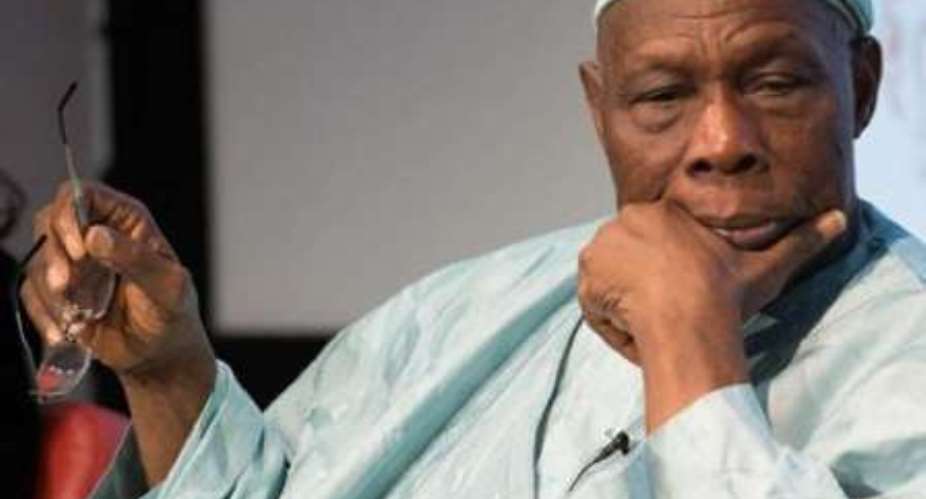By Desmond Davies - London Bureau
London, May 19, GNA - A former Nigerian President, Olusegun Obasanjo, says he retired the usual suspects from the military when he came to power in 1999 to curb the rampant military coups in Nigeria.
The country has since witnessed no coup or attempted coup, he stated in a handbook 'Making Africa Work: A handbook for economic success', which he co-arthored.
Before 1999, the longest period of a civilian rule in Nigeria was for just six years - from independence in 1960 to the first military coup in the country in 1966.
Mr Obasanjo wrote in the book, : 'The military's intervention in Nigerian politics in January 1966 went on like musical chairs for 33 years, fouling the political air, causing instability and uncertainty, causing destruction of lives and properties, resulting in a civil war and leaving the country divided internally and isolated externally.'
Mr Obasanjo was himself a military ruler, having taken over the helm in February 1976 following the assassination of General Murtala Muhammed.
He handed over power to a democratically elected government in 1979, but in 1983 the military intervened again in the Nigerian politics.
The soldiers were to stay in power for another 16 years, until the sudden death in June 1998 of General Sani Abacha whose successor, General Abdulsalami Abubakar, called for elections in February 1999.
Mr Obasanjo, who by then had become a fully-fledged politician, contested the presidency for the People's Democratic Party (PDP), and won.
He explained: 'On assuming office as president [in May 1999], I decided to put an end to the incessant coups.
'I asked the military to submit the list of all officers who had either participated in coups in the past or benefited in the dividends of coups by being appointed to political office as governors or ministers.
'Not knowing what the list was meant for, the military faithfully compiled and submitted it to me as the Commander-in-Chief and Chairman of Council of each of the Arms of service,' Mr Obasanjo wrote, and added, 'Ninety-three offices in all were given six hours' notice of retirement on a Friday, and ordered not to spend the Friday night in uniform or in the barracks to prevent adverse reaction.
'The following Monday, the Service Councils met to ratify the retirement of all the officers.
'From my vantage position and background as a battle-tested and war-victorious General, I knew that an officer out of uniform and barracks is like a fish out of water, and their power and influence would be greatly diminished.'
Mr Obasanjo said: 'The retirement of 93 officers in one day was salutary.
'It meant that taking part in a coup or benefiting from one could catch up with you, no matter how long it would take, and for as long as you are alive.'
'The retirement of the 93 officers did not stop them from entering public life, as some went into politics and became state governors, members of the legislature and government ministers.'
Mr Obasanjo said, 'the idea was not to punish them for life but to exclude then from positions in the military' so that they would not get involved in coups.
'The fact that since 1999 there has not been a coup or an attempted coup in Nigeria speaks of the effectiveness of the measures taken to put an end to the destabilising influence of coups on the political life and dispensation of Nigeria,' Mr Obasanjo wrote.
He noted, however: 'It has neither been easy nor perfect, but there are improvement and evidence of learning among the political class.
'For those countries with similar experiences, there is a need to find an effective and relatively painless way of curbing the incidence of coups and corruption by the military.'
GNA





 Former Kotoko Player George Asare elected SRC President at PUG Law Faculty
Former Kotoko Player George Asare elected SRC President at PUG Law Faculty
 2024 elections: Consider ‘dumsor’ when casting your votes; NPP deserves less — P...
2024 elections: Consider ‘dumsor’ when casting your votes; NPP deserves less — P...
 You have no grounds to call Mahama incompetent; you’ve failed — Prof. Marfo blas...
You have no grounds to call Mahama incompetent; you’ve failed — Prof. Marfo blas...
 2024 elections: NPP creates better policies for people like us; we’ll vote for B...
2024 elections: NPP creates better policies for people like us; we’ll vote for B...
 Don’t exchange your life for wealth; a sparkle of fire can be your end — Gender ...
Don’t exchange your life for wealth; a sparkle of fire can be your end — Gender ...
 Ghana’s newly installed Poland train reportedly involved in accident while on a ...
Ghana’s newly installed Poland train reportedly involved in accident while on a ...
 Chieftaincy disputes: Government imposes 4pm to 7am curfew on Sampa township
Chieftaincy disputes: Government imposes 4pm to 7am curfew on Sampa township
 Franklin Cudjoe fumes at unaccountable wasteful executive living large at the ex...
Franklin Cudjoe fumes at unaccountable wasteful executive living large at the ex...
 I'll 'stoop too low' for votes; I'm never moved by your propaganda — Oquaye Jnr ...
I'll 'stoop too low' for votes; I'm never moved by your propaganda — Oquaye Jnr ...
 Kumasi Thermal Plant commissioning: I pray God opens the eyes of leaders who don...
Kumasi Thermal Plant commissioning: I pray God opens the eyes of leaders who don...
